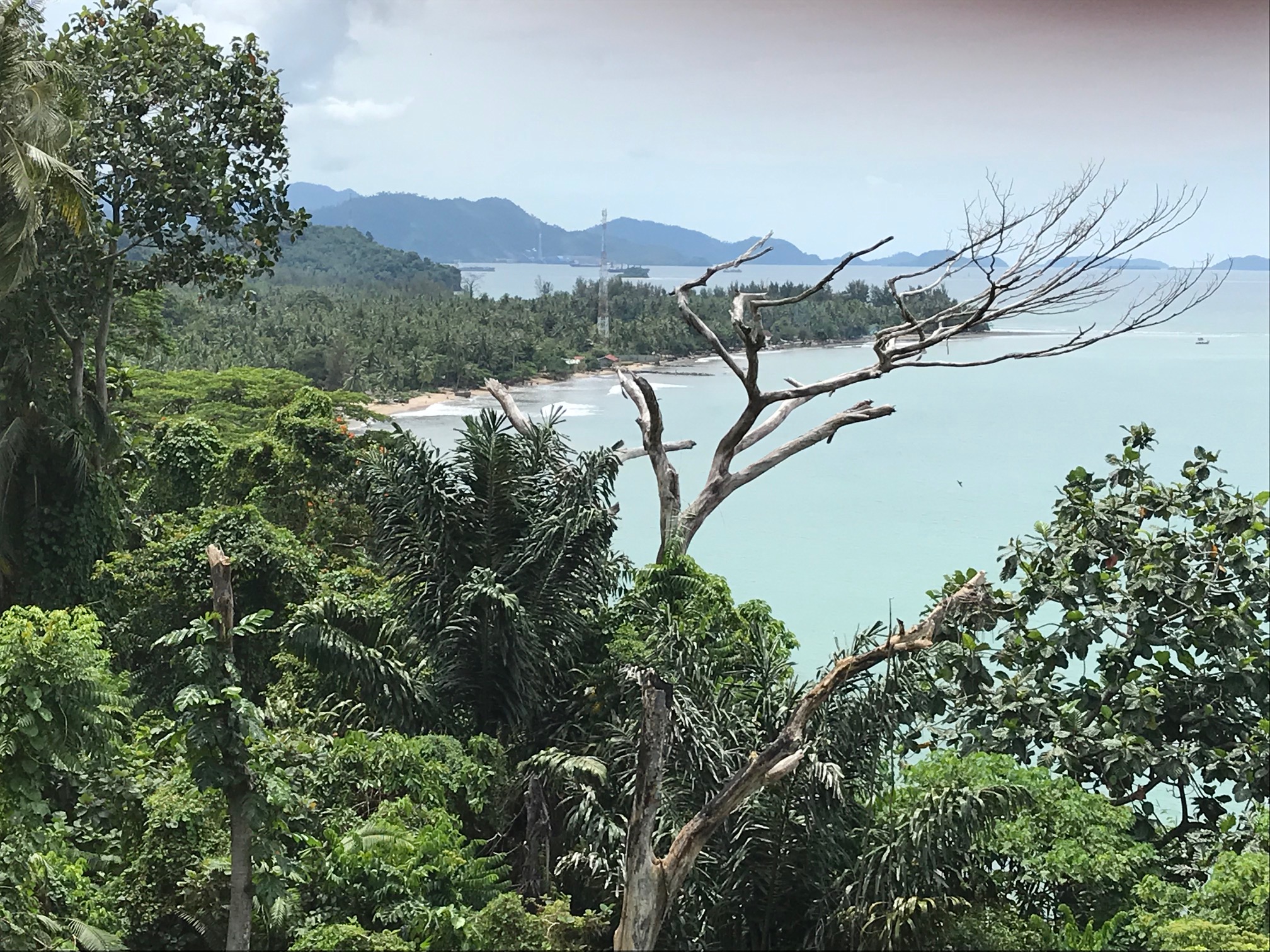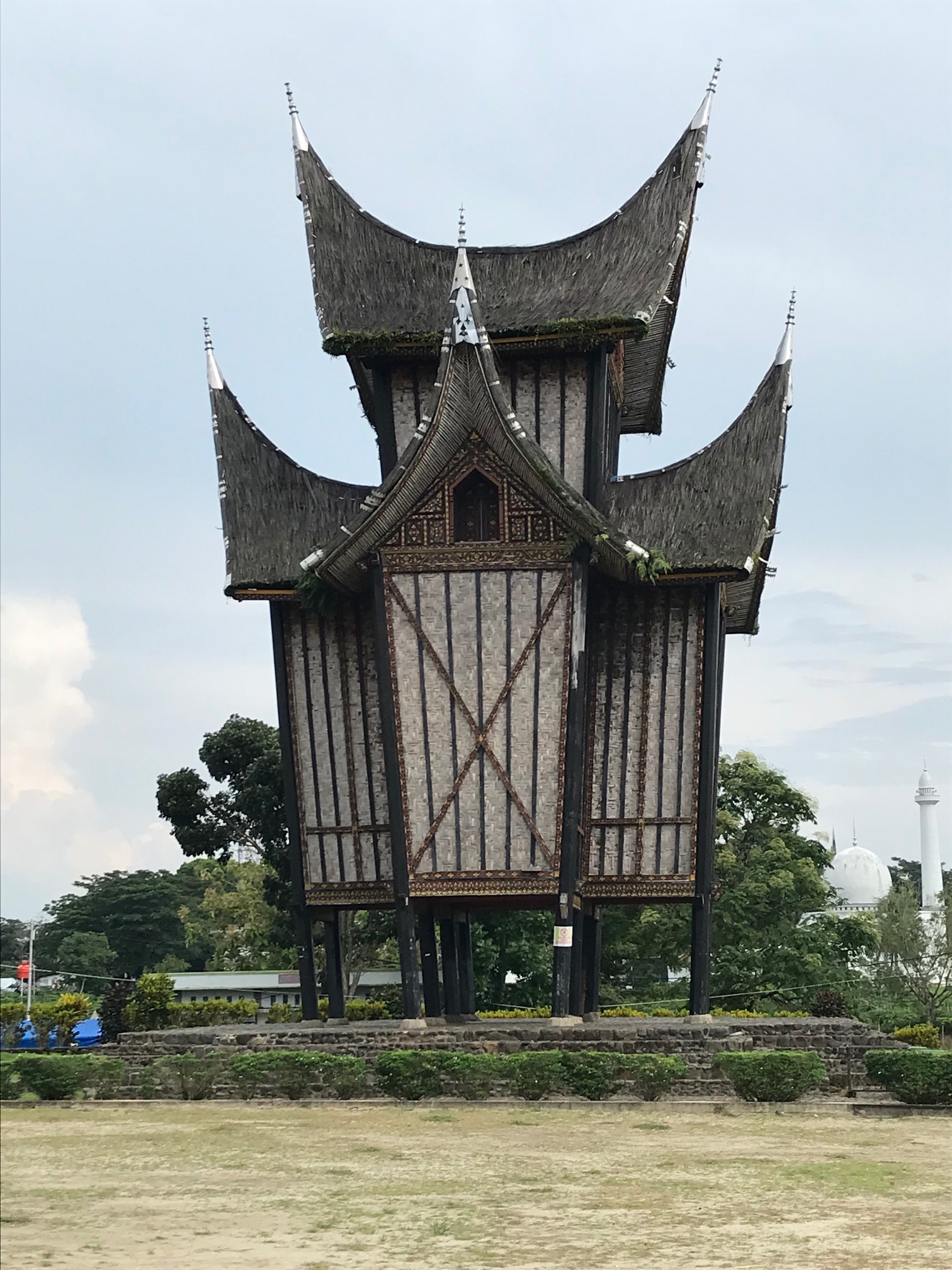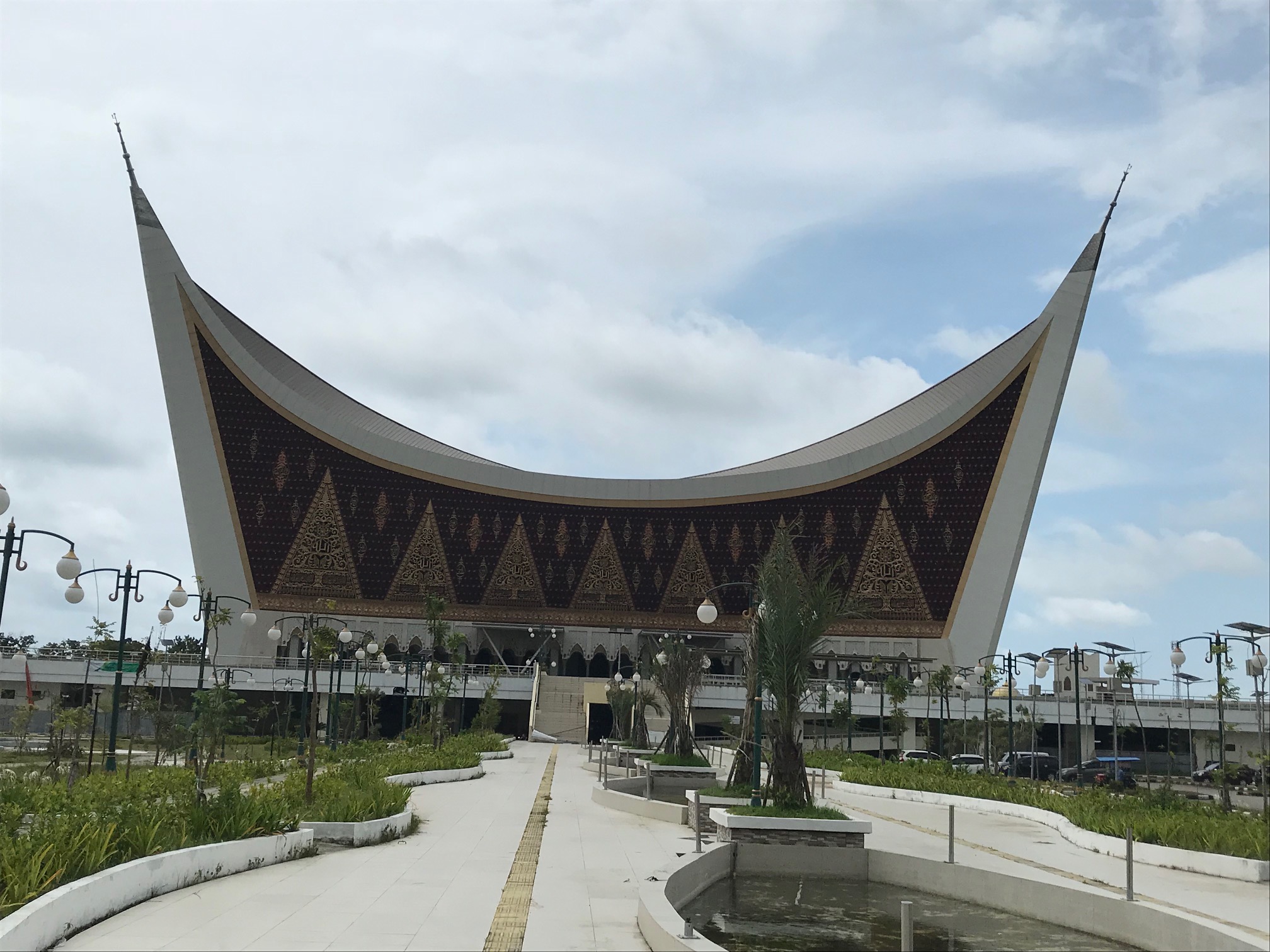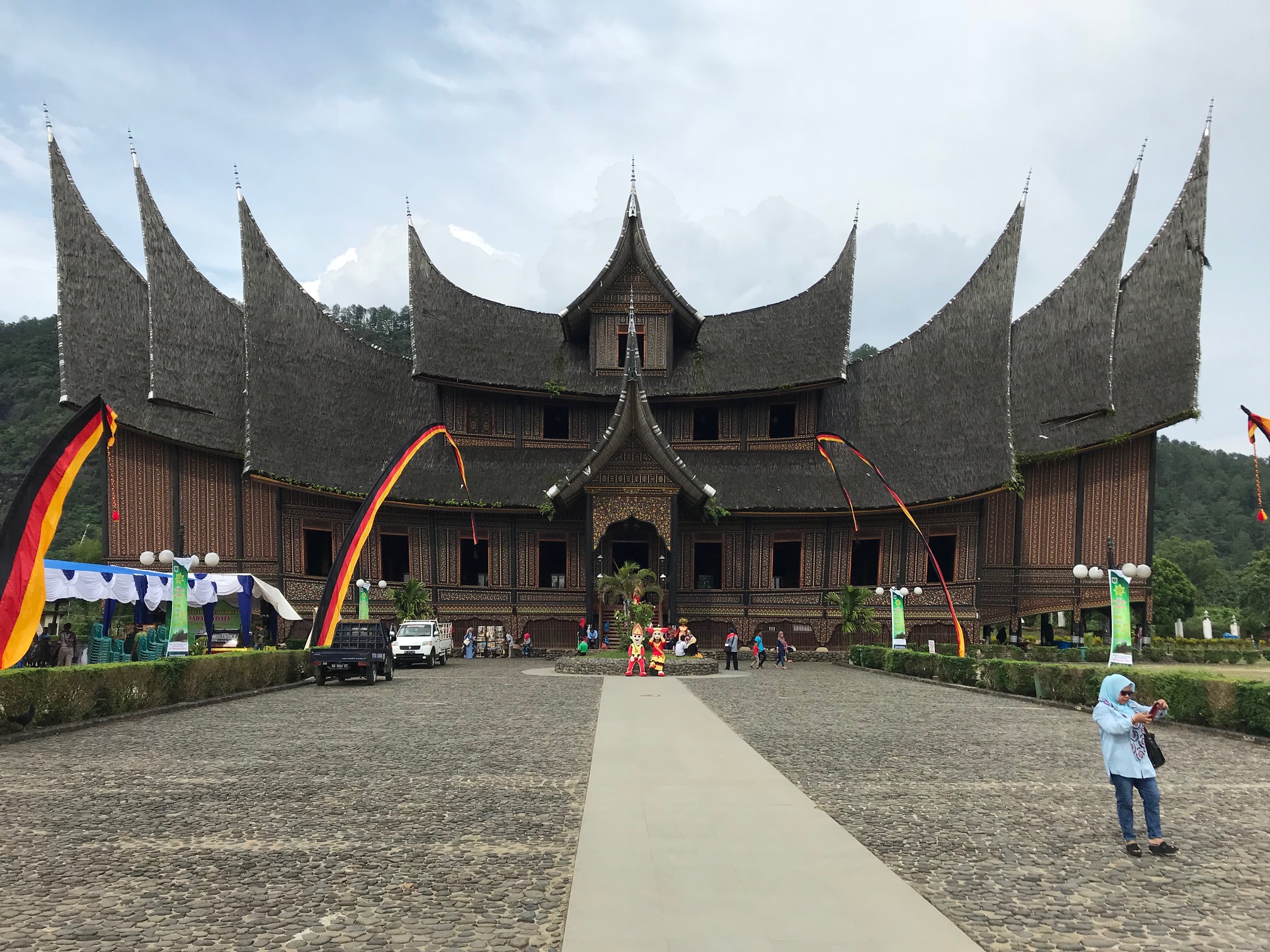The many charms of Indonesia’s West Sumatra
A Maning house in traditional style. Photo by Paul Marshall.
Rendang, traditional-style Padang curry made from beef, coconut and spices. Creative Commons photo.
PADANG — Indonesia’s province of West Sumatra is striking. The major city, Padang, faces a terrifying ocean that has produced terrible tsunamis — there is no major landmass between here and Antarctica— and backs onto the mist-covered mountains that form the spine of the sixth-largest island in the world: Sumatra.
There are many striking things about Padang. Its cuisine is perhaps the most widespread in the country. When traveling throughout Indonesia, there are many wonderful foods, and some such as snake or dog that are for more specialized tastes, but it is always a good idea to look for a Padang restaurant. Inside, you do not order particular foods: instead they simply bring 12-15 small plates of assorted dishes and you pick and choose what you want, and pay only for what you eat.
Among these dishes is rendang, which is small pieces of beef sautéed in coconut and spices until tender. In 2011, an online poll of 35,000 people by CNN International chose rendang as the No. 1 dish of their World's 50 most delicious foods: Readers' picks list. I would vote for that. McDonald’s in Indonesia has even been experimenting with serving rendang burgers, but so far, I have not been impressed.
The coastline of West Sumatra in Padang. Photo by Paul Marshall.
Another feature is Padang’s stunning architecture. Traditional houses and palaces and some wealthier modern homes have dramatic roofs with multi-tiered, upswept gables imitating buffalo horns, since their tradition, like that of many Indonesians, has a central role for buffaloes.
West Sumatra is also a disproportionate source of many famous Indonesians, especially intellectuals and those who played a major part in Indonesian independence. The co-founder of the Republic of Indonesia, Mohammad Hatta, came from here. According to Tempo magazine, six of the top ten most influential Indonesians of the 20th century did also, including three out of four Indonesian founding fathers. This could be because, of course, that it simply produces many talented people, and it is a culture that values learning.
But perhaps another reason is that, given its traditions, it is comparatively more difficult for men to make their way in the local culture, and so they need to go off to seek their fortune.
A matrilineal society in an Islamic culture clash
The traditional people of Padang are the Maningkabau, known also as the Minang. They are nearly all Muslim, and much of Islam around Padang is quite conservative. But the Maning, numbering now perhaps over 6 million, are also probably the world’s largest matrilineal society: women inherit family property, children take their mother’s name, and husbands are guests in their wives’ homes.
Professor Gusti Asnan of Andalus university, the principal university in the province and the oldest Indonesian university outside of Java, knows his people well. This is where he grew up, and he’s a well-trained historian of the area. He knows what the scholars say and what his family says. He told us that no one really knows when the Maningkabau became matrilineal since as far as we can determine they were already so when they migrated to the area. Although the traditions are now diminishing, his grandmother had eight husbands, and he assured us that she was not Elizabeth Taylor. As far as he knew, she had had only one husband at a time, and divorced one before taking another, but other women of her generation may have had several husbands at the same time. Her land came not from her husbands but from her mother.
Paul Marshall with Professor Gusti Asnan of Andalus University. Photo courtesy of Paul Marshall.
The Minang have fought, literally so, to preserve their patterns of life. In the eighteenth century, Muhammad ibn Abd al-Wahhab, from whom the extreme Saudi Wahhabi interpretation of Islam is named, in alliance with the Al-Saud tribe, captured the central regions of the Arabian Peninsula, including the holy cities of Mecca and Medina. This provoked reaction and argument throughout the Muslim world, including Indonesia.
Some of the first major Indonesian conflicts over these changes arose in the early nineteenth century in the Minangkabau highlands. In 1803, after Wahhabis had again taken control of the holy places in Arabia, they influenced many Indonesian students and scholars who, when returning from study or the hajj (pilgrimage to Mecca), often denounced the prevailing enculturated Islam in their homeland as syncretic, even pagan and apostate.
Many locals, with multiple long-standing customs, including the central one of matrilineal succession, sharply rejected such upstart notions. These disputes eventually led to full-scale war. In 1815, returnees from Arabia and their followers, known as Padris, led by Tuanku Imam Bonjol, sought to impose a more austere, Saudi version of Islam on the local population. They rejected local custom, adat, especially the matrilineal social structure, and killed several of the Minangkabau royal family. Their opponents eventually sought help from the local colonial power, the Dutch, who as usual saw both threat and opportunity. In 1821, the Dutch took control of the area but faced a fight that lasted until the Padris were defeated in 1838.
Certainly, there were many important factors in the conflict other than rival interpretations of Islam: all wars have multiple causes. In a changing economy, local merchants thought that they might have greater opportunities under Padri-inspired sharia law than they had under the existing ruling families. After the Dutch intervention, there was also opposition from anti-colonialists. However, a major element of the conflict had been triggered by those who wanted to impose a more austere form of Islam on Muslims comfortable with integrating with Indonesian cultures.
Professor Yasrul Huda, a lecturer at Imam Bonjol State Islamic University in Padang, is a legal anthropologist, studying the complex interactions of co-existing different legal systems. In West Sumatra, this involves understanding how legislation, Islamic sharia and customary law interact, a skill very much needed in this area. He surmised that one reason that West Sumatra had produced so many intellectuals was precisely the need to deal simultaneously with the relations between these different authorities, not only in law, but in society and culture as a whole. Discussions and debates about these issues had been common in the 1920’s and 1930’s, even into the 1950’s, as people were then more open. But now, he lamented, the area is getting more exclusive. People no longer meet and debate across cultural and theological divides.
Paul Marshall with Professor Yasrul Huda. Photo courtesy of Paul Marshall.
Learning Greek philosophy at an Islamic Boarding School
To learn other things, we travelled into the highlands, the heartland of the traditional culture, through precipitous valleys and stunning waterfalls. In Padang Pajang, we visited the Thawalib pesantren, a traditional Islamic boarding school that could perhaps be called a madrassah, except that that word now has too many negative connotations in English.
The school was founded in 1911 and claims to be the oldest pesantren in Indonesia, although that brings up many questions of definition, somewhat like trying to name the oldest Oxford college. Its founder had studied in Mecca and Cairo and was a disciple of the Egyptian reformist scholar Mohamed Abduh, who has influenced many movements in Indonesian Islam.
At this campus, the school has 2,000 students, all boys, but it has a separate and similarly-sized campus for girls. Its head, Yendri Junaidi, showed us around and then in his office, below a photograph of Abduh and others, and above the sounds of the basketball games outside, proudly told us about the school. Like all Indonesian schools, it must first follow the state-mandated curriculum, embracing the usual “secular” subjects. This takes place from 7 am to 3 pm. After that, there was the school’s own additional curriculum, which carried on until 9 pm. When asked about when the students actually managed to rest, he added that the time after 3 pm was lighter, more playful and less stressful. Of course, we could do no in-depth survey of the students’ lives, but those we met appeared happy, and the basketball courts were getting used.
We asked what the additional curriculum covered. One of the three major areas was Islamic literature. Another was Islamic inheritance, which at first seemed strange. Why were high school students studying inheritance patterns? But, of course, in a society where traditionally the women inherited all, but which was nominally also shaped by Sunni sharia schools of inheritance, and which also had local and national elected assemblies that have passed their own inheritance laws, this is a subject that requires very careful attention, lest one day, especially if they were men, they might end up on the street.
The third subject was also striking. Pak Junaidi described it as “logical, clear thinking.” I asked whether this meant philosophy, but he, with due humility, said that no, that would be too grand a word: what they covered was more basic, just the ability to think carefully, which might be a good foundation for studying real philosophy later at university. I then asked who the students read in their “clear thinking” class and he replied “Plato, Aristotle….”
I knew that Greek philosophy has been a central part of Islamic thinking, and a subject of learned debate between medieval Christian, Jewish and Muslim thinkers, but to find that here in the mountains, after having already completed an arduous eight hours of the state curriculum, Indonesian Muslim high school students were studying such thinking was startling. And, although they studied translations, they were not studying textbooks, they were getting as close as they might to original texts—something that American political philosophy undergraduates, and even graduates, often do not.
We drove on, visiting villages with traditional weavers, amazing traditional houses, and the gorgeous Pagaruyung Palace. Behind us, in misted hills, Muslim high school students were assiduously studying Plato and Aristotle. One of West Sumatra’s many surprises and lessons.
Paul Marshall is the Wilson Distinguished Professor of Religious Freedom at Baylor University, a senior fellow at the Hudson Institute’s Center for Religious Freedom, Washington, D.C, and a contributor to Religion Unplugged.








